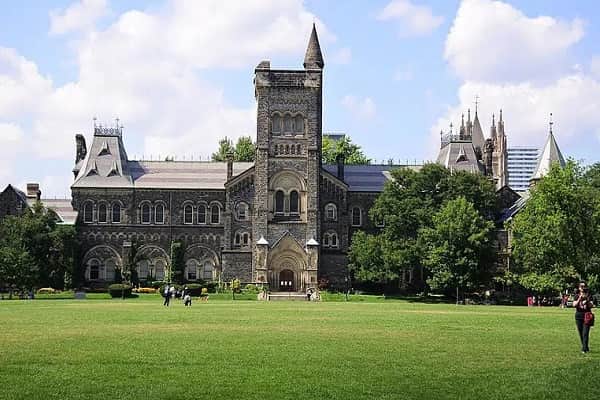10 Best Universities to Study Archeology in Canada [2024]
Get to know the best universities in Canada to study archeology and immerse yourself in the fascinating world of research and preservation of the past. In this article, we introduce you to 10 outstanding institutions that offer quality education, research opportunities and industry connections.
Whether you dream of excavating ancient remains or analyzing historical artifacts, this guide will help you find the ideal university to meet your academic and professional goals in the field of archaeology.
![10 Best Universities to Study Archeology in Canada [2024] 2 10 Best Universities to Study Archeology in Canada](https://allroundgist.com/wp-content/uploads/2024/01/best-universities-to-study-archeology-in-canada_1.jpg)
1. University of Toronto
The University of Toronto has an internationally recognized archeology department, with a focus on North American and Mediterranean archaeology.
2. University of British Columbia
UBC offers archeology programs that combine practical experience in excavations and laboratories with strong theoretical training in indigenous cultures and heritage.
3. McGill University
At McGill, students have access to collections of unique artifacts and participate in research projects in diverse fields such as historical archeology and bioarchaeology.
4. University of Alberta
The University of Alberta is noted for its northern archeology program, focused on indigenous cultures and subarctic archaeology.
5. Simon Fraser University
With a focus on coastal and maritime archaeology, Simon Fraser offers unique research opportunities in the Pacific Northwest and surrounding areas.
6. University of Calgary
The University of Calgary stands out for its research programs in historical archaeology, landscape archeology and experimental archaeology.
7. University of Manitoba
This institution offers archeology programs ranging from prehistoric archeology to cultural contact archaeology.
8. University of Western Ontario
The UWO focuses on historical archeology and has advanced laboratories for artifact analysis and excavations at relevant sites.
9. University of Saskatchewan
The University of Saskatchewan offers a wide range of courses and research opportunities in First Nations archeology and historical archaeology.
10. University of Lethbridge
With its anthropological archeology program, the University of Lethbridge focuses on understanding human culture through the study of material remains.
| University | Notable Strengths | Type | International students | Student/Teacher Ratio | Campus Life | Connections with Industry |
|---|---|---|---|---|---|---|
| University of Toronto | Research in archeology of North America and the Mediterranean | Public | fifteen% | 18:1 | Cultural, sporting activities and student societies | Collaborations with museums and heritage agencies |
| University of British Columbia | Practical experience in excavations and laboratories, focus on indigenous cultures | Public | twenty% | 16:1 | Campus with panoramic views, clubs and student associations | Collaborations with indigenous communities and research centers |
| McGill University | Access to unique collections, research projects in historical archeology and bioarchaeology | Public | 25% | 17:1 | Cultural, sporting and recreational events on campus | Collaborations with heritage institutions and scientific organizations |
| University of Alberta | Northern Archeology Program, Focus on Indigenous and Subarctic Cultures | Public | 12% | 20:1 | Sports facilities, student activities and cultural events | Collaborations with indigenous communities and research agencies |
| Simon Fraser University | Focus on coastal and maritime archaeology, research in the Pacific Northwest | Public | 10% | 19:1 | Clubs, student organizations, and cultural events on campus | Collaborations with scientific institutions and conservation groups |
| University of Calgary | Research programs in historical, landscape and experimental archeology | Public | 18% | 21:1 | Sports, clubs and student activities on campus | Collaborations with museums and heritage preservation organizations |
| University of Manitoba | Courses in prehistoric archeology and cultural contacts | Public | 8% | 22:1 | Musical recitals, art exhibitions and sporting events | Collaborations with indigenous communities and archaeological organizations |
| University of Western Ontario | Focus on historical archaeology, advanced analysis laboratories, excavations at relevant sites | Public | fifteen% | 17:1 | Student clubs and associations, modern sports facilities | Collaborations with museums and research centers |
| University of Saskatchewan | Research Opportunities in First Nations Archeology and Historical Archeology | Public | 12% | 19:1 | Cultural, social and sporting events on campus | Collaborations with indigenous communities and heritage organizations |
| University of Lethbridge | Anthropological archeology program, study of material remains to understand human culture | Public | 10% | 20:1 | Student clubs and activities, recreational sports facilities | Collaborations with archaeological institutions and research groups |
What is the Best University to Study Archeology in Canada?
The University of British Columbia (UBC) is considered one of the best institutions to study archeology in Canada. This university stands out for its commitment to research and academic excellence in the field of archaeology. It has a solid archeology program that offers students comprehensive training in all areas of this discipline.
UBC has a highly trained and internationally recognized teaching staff, which guarantees quality education. In addition, the university has modern facilities and laboratories equipped with cutting-edge technology, allowing students to carry out high-level archaeological research and projects.
The University of British Columbia is also distinguished by its interdisciplinary approach, meaning that students have the opportunity to combine their training in archeology with other related disciplines, such as anthropology, history or geography. This gives students a broader perspective and allows them to approach complex problems from different angles.
The location of UBC is also a relevant factor, as it is located in the city of Vancouver, which has a rich history and cultural heritage. This provides students with numerous opportunities to conduct archaeological excavations at historic sites and participate in heritage conservation and preservation projects.
In short, the University of British Columbia stands out as one of the best options to study archeology in Canada due to its commitment to research, its outstanding faculty, its modern facilities, and its interdisciplinary approach. Additionally, UBC’s prime location in Vancouver offers students unique opportunities to develop their careers in the field of archaeology.
How much does it cost to study Archeology in Canada?
Studying an Archeology degree in Canada can involve significant costs. Prices vary depending on the university and the chosen study program. In general, tuition rates for international students are typically higher than for Canadian residents. In addition to tuition fees, students must also consider other expenses, such as accommodation, transportation, books, and supplies.
It is important to note that tuition fees can vary considerably between different universities. For example, some public universities offer archeology programs with more affordable tuition rates, especially for permanent residents. On the other hand, private universities and renowned institutions may have higher costs.
In any case, it is essential to do your research and compare the costs of different universities before making a decision. Additionally, many colleges offer scholarships and financial aid programs to help students mitigate the costs of education.
What is the salary of an archaeologist in Canada?
The salary of an archaeologist in Canada can vary depending on several factors, including the individual’s geographic location, experience, and education level. In general, salaries for archaeologists in Canada are competitive and provide a reasonable living.
For recent graduate archaeologists, starting salaries can be around $40,000 to $50,000 CAD per year. As they gain more experience and advance in their careers, archaeologists may be able to earn salaries in excess of $70,000 CAD per year. However, it is important to note that these numbers are only estimates and may vary depending on the individual situation.
It is essential to research and take into account the specific employment landscape for archaeologists in the region of Canada where you wish to work. Additionally, pursuing a graduate degree or specialization in the field of archeology can benefit professionals seeking better salary opportunities.
What is the admission process to study Archeology in Canada?
The admission process to study Archeology in Canada varies depending on the university and the specific program you wish to enter. The general steps to follow are summarized below:
1. Research: Collect information about archeology universities and programs in Canada. Compare admission requirements, study plans, and research opportunities.
2. Online Application: Complete the online application through the admissions portal of your chosen university. This step typically requires the submission of personal information, academic records, and letters of recommendation.
3. Language tests: If Spanish is not your native language, you may be required to take a recognized English language test, such as the TOEFL or IELTS, to demonstrate your language proficiency.
4. Essays and personal statements: Some universities may require applicants to submit essays or personal statements demonstrating their interest in archeology and their motivations for studying in Canada.
5. Application review: Once the application is submitted, the admissions committee will carefully review all documents and evaluations to make a decision.
6. Confirmation and acceptance: If your application is successful, you will receive an acceptance letter from the university. From there, you must follow the indicated steps to confirm your acceptance and secure your place in the program.
Read Also: The 10 Best Universities to Study Finance in Canada
It is important to note that these steps are general and may vary by university and specific program. It is recommended to consult each university’s website for detailed information on admission requirements.


![10 Best Universities to Study Aeronautical Engineering in Canada [2024] 4 10 Best Universities to Study Aeronautical Engineering in Canada](https://allroundgist.com/wp-content/uploads/2024/01/best-universities-to-study-aeronautical-engineering-in-canada_1.jpg)

![20 Cities With The Most Millionaires In The World [2023 Updated] 6 20 Cities With The Most Millionaires In The World](https://allroundgist.com/wp-content/uploads/2023/01/cities-with-the-most-millionaires-in-the-world_img_182635-min-1.jpg)


**mitolyn**
Mitolyn is a carefully developed, plant-based formula created to help support metabolic efficiency and encourage healthy, lasting weight management.
В лабиринте игр, где любой сайт норовит зацепить заверениями легких джекпотов, рейтинг лучших казино онлайн
является именно той картой, что ведет через заросли обмана. Игрокам хайроллеров и начинающих, которые устал из-за фальшивых заверений, это инструмент, чтоб ощутить реальную rtp, как ощущение выигрышной фишки на пальцах. Обходя лишней болтовни, просто надёжные клубы, там rtp не лишь цифра, а конкретная удача.Подобрано по гугловых поисков, будто сеть, что ловит наиболее актуальные тренды в рунете. Здесь нет места к шаблонных приёмов, всякий элемент будто ход в игре, там обман выявляется мгновенно. Игроки знают: в рунете тон письма на сарказмом, где сарказм маскируется как совет, помогает обойти рисков.В https://www.reverbnation.com/don8play/shows такой рейтинг лежит как раскрытая колода, готовый на старту. Зайди, когда желаешь ощутить биение реальной азарта, минуя обмана и разочарований. Игрокам что любит вес выигрыша, это словно держать карты в руках, а не глядеть в монитор.
http://images.google.ki/url?q=https://t.me/s/officials_7k/235
https://t.me/officials_pokerdom/3214